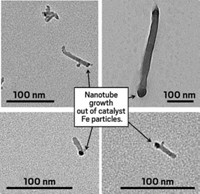Advertisement
Grab your lab coat. Let's get started
Welcome!
Welcome!
Create an account below to get 6 C&EN articles per month, receive newsletters and more - all free.
It seems this is your first time logging in online. Please enter the following information to continue.
As an ACS member you automatically get access to this site. All we need is few more details to create your reading experience.
Not you? Sign in with a different account.
Not you? Sign in with a different account.
ERROR 1
ERROR 1
ERROR 2
ERROR 2
ERROR 2
ERROR 2
ERROR 2
Password and Confirm password must match.
If you have an ACS member number, please enter it here so we can link this account to your membership. (optional)
ERROR 2
ACS values your privacy. By submitting your information, you are gaining access to C&EN and subscribing to our weekly newsletter. We use the information you provide to make your reading experience better, and we will never sell your data to third party members.
Environment
Soy Biodiesel Emissions May Trigger Inflammation
Biofuels: Compared to petrodiesel emissions, biodiesel exhaust causes more inflammation in human cells and in mouse lungs
by Laura Cassiday
October 2, 2013

Biodiesel, a fuel derived from animal or vegetable fats, is often touted as an environmentally friendly alternative to diesel made from petroleum. The fuel comes from a renewable resource, and burning it generates fewer greenhouse gases and less particulate matter than petrodiesel produces. However, very little is known about the health effects of biodiesel exhaust. Now a study finds that, compared to petrodiesel emissions, biodiesel exhaust may trigger greater inflammation in mammalian cells and lungs (Environ. Sci. Technol. 2013, DOI: 10.1021/es403146c).
In the U.S. and elsewhere, there is increasing interest in replacing or blending fossil fuels with renewable fuels like biodiesel, says Naomi K. Fukagawa of the University of Vermont. “Before going full steam ahead in shifting to new fuels, we should know the potential health consequences,” she says.
So Fukagawa and her colleagues collected exhaust particles from a Volkswagen light-duty diesel engine, fueled by either ultralow-sulfur petrodiesel or a certified soy-based biodiesel blend. The blend, known as B20, consisted of 20% biodiesel and 80% petrodiesel. B20 is commercially available and can be used in existing diesel vehicles without modifying the engines.
The team first analyzed the exhaust produced from both fuels using a scanning mobility particle sizer and thermal desorption/gas chromatography mass spectrometry. The petrodiesel generated two times as much particulate matter by mass as B20 did. However, the total surface area of B20-generated particles was twice as high as that for petrodiesel-generated particles because B20 combustion produced, on average, smaller particles. The chemical composition also differed between the two exhausts: Polar compounds made up 46% of the petrodiesel particles, compared to 68% for B20. The biodiesel-blend particles also contained short-chain fatty acid methyl esters, which are known lung irritants. These esters were absent from petrodiesel exhaust.
Next, the researchers exposed two human cell lines—macrophages and bronchial epithelial cells—to either petrodiesel or B20 exhaust particles for 24 hours. Cells treated with B20 particles released more proteins associated with inflammation than did those exposed to petrodiesel particles or untreated cells. For example, macrophages treated with B20 particles secreted about twice as much of the protein granulocyte colony-stimulating factor (G-CSF) as those treated with the same amount of petrodiesel particles by mass.
To test the effects of exhaust particles in living animals, Fukagawa and her colleagues aspirated a solution of the particles into the lungs of female mice once a day for three consecutive days. The researchers then euthanized the mice and collected tissue and fluid from their lungs. The concentrations of three inflammatory proteins—G-CSF, interleukin 6, and interferon-gamma-induced protein 10—were about two to three times higher in the lung tissue and fluid from B20-exposed mice than in animals exposed to petrodiesel particles. Persistent lung inflammation has been linked to diseases like chronic obstructive pulmonary disease, asthma, and lung cancer.
The inflammatory response caused by B20 particles may arise from some combination of the particles’ large surface area, their polar chemical composition, or the presence of short-chain fatty methyl esters, the researchers say. “Our findings do not mean that biodiesel is bad and should not be used,” Fukagawa says. “Rather, we need to know more about its components so we can design new engines or filters that will remove harmful components” in biodiesel exhaust.
Flemming R. Cassee of Utrecht University, in the Netherlands, says the researchers have added valuable data to the field’s limited knowledge of the health risks of biodiesel exhaust. However, he notes that the researchers tested only a fraction of the total exhaust: the particulate matter. Other components of the exhaust also could have health effects.




Join the conversation
Contact the reporter
Submit a Letter to the Editor for publication
Engage with us on Twitter